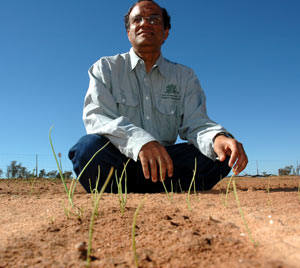Onion experts say goodbye to teary ending
Note: This content is stored on an archive website and may not be current or accurate. Contact us to clarify.

The next time you slice an onion it doesn’t have to end in tears, according to NSW Department of Primary Industries (DPI) research.
NSW DPI researchers are busy working on mild onion varieties with low pungency and have found that manipulating irrigation supply to onion beds may mean fewer tears in the kitchen.
“Choosing the right soft onion variety coupled with accurate watering greatly reduces acid levels responsible for our teary reaction when cutting onions,” NSW DPI researcher Mohammad Quadir said today.
“Onions cause tears because they contain high quantities of pyruvic acid which is released when an onion is cut and exposed to air.
“Soft onion varieties like Mellow Yellow, Predator and Sombrero are being tested under drip irrigation at Yanco Agricultural Institute and apart from just saving tears manipulating irrigation using a drip system is also saving significant amounts of water.”
The three varieties were grown on 1.5 metre beds under three irrigation frequencies – watering every two days, every four days and at seven day intervals.
“Highest marketable yields for all three varieties were recorded for the two day interval treatments, with Mellow Yellow the highest yielding 61.6 tonnes a hectare,” Dr Quadir said.
“The two day interval irrigation also resulted in consistently larger bulbs, with an average of 60 per cent bulbs larger than 75mm in diameter.”
NSW DPI district horticulturist Mark Hickey said the drip irrigation across all three intervals consistently reduced pyruvic acid levels, well within the acceptable range for mild onions.
“About 14 per cent of the national onion crop is grown in NSW and 90 per cent of that is grown around Griffith,” Mr Hickey said.
“Mild onions represent a very small portion of the NSW onion crop and therefore this trial is identifying best management for mild onions to make growing them a viable option for NSW vegetable growers.
“Supplying consumers with mild onions all-year-round is also a challenge. They are harvested between October and February and therefore storage is important.
“Our work is also looking at which mild varieties are most suitable for storage and management techniques that enhance their storage life.”
Media Contact: Brett Fifield 02 6391 3311, 0427 029 511

